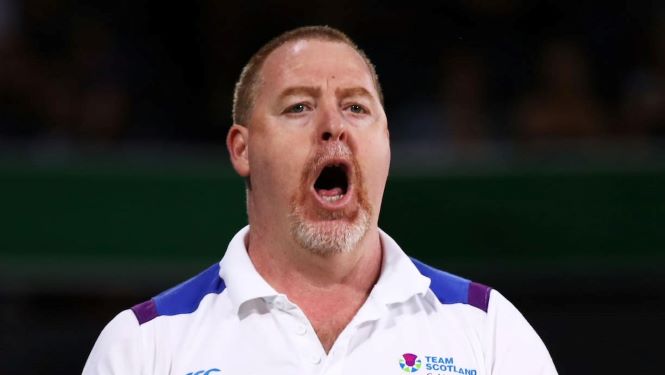
In today’s interview, we talk to Rob Beveridge, the founder of Bevo International Coaching. Rob is a professional basketball coach with an impressive sporting career spanning over three decades. He has coached for 15 National Junior Championships, 300+ NBL (National Basketball League) Games, the Olympic and Paralympic Games, the 2018 Commonwealth Games and various World Championships. Rob is well-known for building successful programmes and player development across the world.
Rob, tell us your sporting story
I’ve been a professional basketball coach for 28 years. I played in the juniors all the way through; in the under 14s, 16s, 18s and 20s. I had dreams of being a professional player, but I was realistic about my ability and knew I was never going to be good enough. So, I made a decision when I was 17 to become a basketball coach. Once I had made this decision, I became very focussed and I started coaching all the younger kids.
I went to university, earnt a couple of sports science degrees and started getting experience. I’ve worked everywhere; with junior kids right through to coaching at the Olympics. I’ve been at three World Championships, two Commonwealth Games (where we had tremendous success) and won at a World Championship. I’ve also coached in the International Basketball League for over 10 years.
What do you love most about your job?
I’ve always been athlete-centred, trying to help athletes and put them in positions to succeed. I build programmes around the athlete so they have everything they need to thrive; from sports psychologists and nutritionists to doctors and physios. The holistic approach of helping athletes is what I’m most passionate about. There’s a perception that players are really strong, like superheroes, when the reality is far from this; some athletes are often very fragile. Being able to help them succeed is incredibly rewarding.
What is the most challenging part of your role as a coach?
Working with different organisations is really eye-opening; some are athlete-orientated, whereas others aren’t. The organisations that value their athletes and support them through thick and thin are the ones that are most successful. I’ve worked with some organisations with poor management who completely disregard the athlete’s emotional and mental wellbeing; they are happy to get rid of a player just because they’re not in a good place. Working with this type of management can be really challenging.
What sporting achievements are you most proud of and why?
Back in 2000, I had an amazing experience of being at the Sydney Olympics. Walking through the tunnel to 110,000 people cheering was incredible; it was the pinnacle of my career. The moment I’m most proud of was when I won a World Championship in 2003 with the World Under 20 Championships. I was working with an amazing group of athletes and staff who were focussed on the end goal.
Last year’s Commonwealth Games where I coached Scotland (my homeland) was another big achievement. We beat ranked teams around the world and it helped put Scottish basketball on the map, which was a big milestone.
What have been your career lows?
I always get a buzz out of the success of my athletes, but when I see my athletes get screwed over by management, that’s really hard to swallow. I’ve had players who are suicidal and I’ve been there holding their hand through it. Seeing players retire due to mental health issues, being at their lowest with their lives spiralling out of control, is a real career low for me.
Working with unsupportive organisations who don’t invest in their players and cast them off is also a downside to my job. I do my best to build athletes up to become confident players, but without a supportive organisation, players don’t flourish and it makes my job really hard. There’s a lot of pressure on coaches to succeed, which at times can make it a very isolating job. I always operate an open-door policy with my players as I want them to feel they can come and talk to me to get support when they need it.
I had an experience where one of my athletes was acting out of character so I knew something wasn’t right with him. I’ve known him for 15 years so his change in behaviour was strange; I suspected he had a mental health issue. I went to my management to flag it up and asked if we could refer him to a psychologist. Their response was “Get rid of him. We don’t want people like that in the organisation, they’re damaged goods”. I was completely dumbfounded and blown away by this response. I understand it’s the club’s livelihood and they don’t want the hassle, but I couldn’t believe they would let go of a player due to a mental health issue.
How do you manage pressure?
My whole career has been about helping other people. In professional sport, player welfare officers have been put in place to help athletes, but there is zero support for coaches. Even though I’ve never been diagnosed with a mental health condition, I have suffered depression and anxiety. I’ve been in some really dark places. Having been a coach for 28 years, there’s been plenty of highs and lows. I work with a sports psychologist who helps our players to develop different mental skills and coping mechanisms. She’s my rock and she has helped me get through some difficult times.
I also have a very small inner circle of friends who support me and get me through tough times. These are friends who don’t care about basketball, they only care about who I am as a person. There are a lot of false people in the industry so I’m grateful to have my friends outside of work. My wife is my greatest supporter and I’m very lucky to have her. I’ve also got a close-knit family who is always there to give me support, which I’m very grateful for.
The pressure on coaches is immense and daunting, especially when you’re in the public eye. In my opinion, social media has become one of the biggest issues in mental health in recent years. Online bullying and trolling are a real problem. My family have been directly affected by it too; my kids get abused on social media because I’m the coach of the team that may have lost a game.
Self-talk, both negative and positive, is a big part of sport and mental health. Do you practice self-talk?
Absolutely. It’s what we’re trying to teach our players. I describe self-talk as this little birdie sitting on your shoulder who is constantly talking to you throughout the day. The majority of the things the birdie says are negative, so it’s how you listen and react to the birdie that matters. When we teach our athletes about self-confidence, we explain that confidence comes from taking action. When you take positive action, you have more self-belief and it’s easier to ignore the negative self-talk.
My preparation for a game is impeccable, so I know when I’m going into the game, I won’t second guess myself. If a player knows they have done the prep, they feel good and ready to play. On the flip side of this, those who listen to negative self-talk are the ones who haven’t done the work. They may have taken a short cut, turned up late or left early; they make every excuse under the sun not to do the work. The only way to make yourself feel good is by doing positive self-talk. The same goes for social media; don’t read negative comments or posts as it only brings you down and makes you doubt yourself.
Did you have any rituals before a game?
Yes, I do. On game day, we always have our shoot around early. I try to keep it as casual as possible as I don’t want to put too much pressure and expectation on myself and the players. My ritual is to get up and grab a coffee, I then go in to practice. Afterwards, I go for a bit of a wander or a walk by myself listening to music. Then I come home to have lunch and I like to be on my own for two to three hours. I read a book, have a quick nap or watch a bit of telly. I just need this quiet time on my own. I try to keep everything pretty level headed. When at the game, I like to go into the stadium and just sit there, look around and absorb the atmosphere of the place.
Do you take time to self-care? What do you do?
Certainly not enough. I finished coaching almost 12 months ago, but during that time I’ve done an enormous amount of reflection. I’ve also travelled extensively and had time to self-educate. I was 100% burnt out, working for people who only care about themselves and their agenda. Going forward, I’ve promised myself to only work with good people who are honest and genuine. Self-reflection and taking time out for myself is just what I needed to rejuvenate and re-focus.
What motivates you to keep going on ‘bad’ days?
My family and kids. Their unconditional support is key. My players also keep me going. I work with some incredibly inspiring and wonderful human beings.
What advice can you offer other sports professionals to help keep their head in the game?
Have a close and small inner circle of people you trust and can rely on to be there for you. Identify people who suck the life out of you and avoid them at all costs. There are some amazing elite coaches out there who are successful because they care for their staff and athletes. Find a coach like this; someone you can bounce ideas off and get support from. Having a mentor is one of the greatest things I’ve had as my mentor has kept me level-headed and given me perspective. Everyone should have a great mentor.
Enjoy this interview?
Join our mailing list to get notified when we post more interviews.


